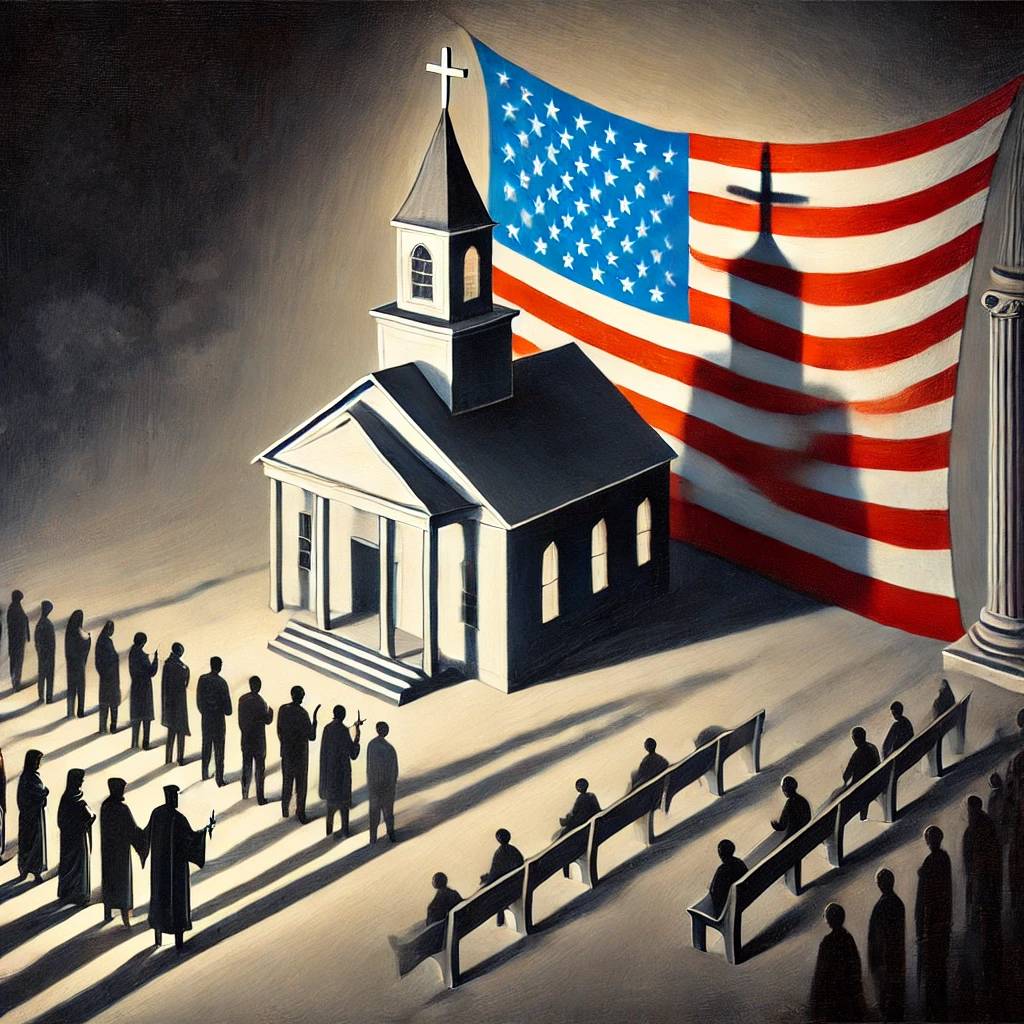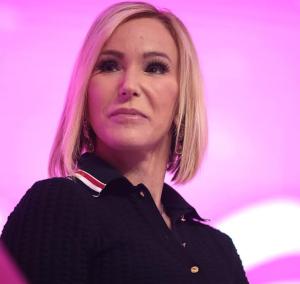
And Many Christians Think That’s A Problem
Donald Trump has announced that controversial right-wing pastor Paula White-Cain will lead the White House Faith Office that he recently created. She also will continue to serve as Trump’s faith adviser. The two of them are dangerous to religious freedom, but there are ways Americans can fight to protect everyone’s rights.
Some Christians are angry about her appointment, and they are justified. At face value, the announcement concerns a routine presidential appointment.
However, it’s much more than that. Trump and White-Cain apparently think America was created by and for Christians alone, and they don’t want anything to change.
We might do well to look at this situation more closely and ask ourselves why a non-religious man like Trump would create a faith office in the first place. He may brag about being Christian, but when asked specific questions about his faith, he awkwardly rambles for a few minutes without giving answers.
He cannot tell you anything about the Bible or talk about his faith. What is his favorite Bible verse? He doesn’t know. How has his faith grown in recent years? He cannot say. He also isn’t familiar with certain important Christian rituals such as taking communion. Rather than take the bread, he once tried to put money in a communion plate.
His staff should at least give him a “favorite” verse to recite when asked and tell him there’s a difference between a communion plate and an offering plate.
The point is that Trump isn’t interested in Christ, Christianity or religion. But he is interested in money, power and ensuring his evangelical base remains loyal.
It’s still hard for me to believe that Americans elected a man who should be sitting in a prison cell for his numerous crimes. Our Founding Fathers anticipated many of the problems that would one day face the U.S. But as intelligent and forward thinking as they were, they probably did not anticipate a felon serving as president. They would be rolling in their graves if they knew.
But let’s get back to the White House Faith Office and Paula White-Cain.
The Faith Office & Trump’s Faith Officer
What exactly is the White House Faith Office?
- What is its purpose?
- Who is Paula White-Cain?
- What are her religious and political beliefs?
- In what direction will she lead the faith office?
- What can Americans do to protect religious freedom?
“The new office, according to (an executive order), is tasked with various projects, such as making recommendations to the president, advising various federal agencies and consulting with faith leaders who hold expertise in a broad range of areas, such as ‘strengthening marriage and family,’ ‘lifting up individuals through work and self-sufficiency,’ and ‘defending religious liberty,’” Religion News recently reported.

Pastor Paula White-Cain at the 2021 Young Women’s Leadership Summit, which was hosted by Turning Point USA and held at the Gaylord Texan Resort & Convention Center in Grapevine, TX. (Photo courtesy of Wikimedia Commons and Gage Skidmore)
White-Cain is a long-time Florida pastor who has been Trump’s faith adviser for several years and is at home in Trump’s right-wing inner circle.
During the 2020 election, she talked about his “demonic enemies,” called on “angelic reinforcement” to keep Trump in the White House and told Christians they would “stand accountable before God” if they didn’t vote for him. At one point, she even said that saying “no” to Trump was the same as saying “no” to God. Really?
Tilting at Windmills
Trump’s faith adviser is tilting at windmills when she says the new faith office “will combat discrimination against Christians in federal institutions and ensure religious liberties are upheld across the country.”
Admittedly, Christians face discrimination and possible death in certain foreign countries. Some have died because of their faith in places like Sudan, Nigeria and the Middle East. If Trump and White-Cain are sincere in wanting to help persecuted Americans in this country, they need to focus on Jewish Americans, Muslim Americans, Hindus, Buddhists and other minorities.
Christian Domination
America has been dominated by Christians since white European settlers reached our shores in large numbers. We as Christians also have had nearly 250 years to get a firm grip on American politics, culture and anything else we wanted.
According to Gallup polling as of 2023, “about three in four Americans said they identify with a specific religious faith. By far the largest proportion, 68 percent, identify with a Christian religion.”
Here’s the breakdown:
- 33 percent — Protestant
- 22 percent — Catholic
- 13 percent — another Christian faith or simply identified as “Christian”
Keep in mind that the 68 percent majority includes all Christians, including those who are not white. Even so, white Christians hold a great deal of power in the U.S.
Seven percent of Americans identify with a non-Christian religion:
- 2 percent are Jewish
- 1 percent are Muslim
- 1 percent are Buddhist
- The remainder are other minority religions in the U.S.
About 22 percent of Americans reported no religious preference, and three percent didn’t respond to the question.
Let’s also look at political power in the U.S.
- 88 percent of the U.S. House of Representatives identifies as Christian, which leaves only 12 percent for every other religious and non-religious group
- 6 percent is Jewish
- 3 percent of the House doesn’t identify with any religion
- The remainder identifies with non-Christian religions (per the Pew Research Center)
The Fears of White Christians
Despite these findings, radical right-wing Christians — if we can even call them Christian — are afraid of losing political power to gays, people of color, Christians who don’t share their narrow and bigoted beliefs, Muslims and other non-Christians.
They’re afraid of retribution from African Americans whose ancestors were black slaves on whose backs the nation was founded; Native Americans who lost their homelands to white settlers; gays and others who aren’t heterosexual; and so forth.
Christian nationalists are afraid of losing out financially as American society changes, and they’re afraid that American culture is moving away from them. They’re afraid.
You might think I would be on the Christians’ side because I’m a white Christian woman, but injustice concerns me. And white American Christians have been guilty of spreading injustice for centuries.
White-Cain’s Beliefs
What’s wrong with the beliefs of Trump’s faith adviser? From the center, where I have spent my adulthood as a Christian, Methodist and Democrat, it seems that Paula White-Cain’s interpretations of Christ’s teachings are distorted, as is her understanding of the U.S. Constitution. Of special concern are her support of Christian nationalism and the prosperity gospel.
Christian Nationalism
White-Cain is a Christian nationalist, though it’s doubtful she sees her beliefs as unchristian or an unhealthy and dangerous form of patriotism.
According to sociology professors Andrew Whitehead and Samuel Perry, Christian nationalists believe that “America has been and should always be distinctively Christian from top to bottom, in its self-identity, interpretations of its own history, sacred symbols, cherished values and public policies, and it aims to keep it this way.”
Another organization — the Christianity.com website — explains, “Christian nationalism, far from being a missional effort to make the name and way of Jesus known to America, is fundamentally a battle for cultural recognition and legal privilege.”
Some of the battlegrounds and my thoughts about them are as follows:
Battleground: Allowing (Protestant) prayers in public schools
My thoughts: Children who want to pray in school should be allowed to silently pray before the school day begins. However, no child should be forced to pray or not pray.
This issue shouldn’t even be an issue. With American children falling behind children from other countries, schools need to focus on education, particularly on subjects such as math, science, English and history. Parents and churches should be responsible for teaching children about faith.
Battleground: Outlawing gay marriage
My thoughts: Civil unions between gays should be allowed. That decision would at least be a compromise between the two major sides of the battle.
Battleground: Outlawing abortion
My thoughts: Women should have the right to make decisions about their own bodies without interference from the government or the Republican party. I’m just very grateful that I’m no longer a young woman.
Battleground: Allowing Christian symbols on government buildings
My thoughts: The U.S. Constitution gives Americans the right to worship or not worship as they please, without government involvement or interference. If government buildings display Christian symbols, they should open the door to displaying non-Christian symbols as well.
(My Patheos article “Radical Right Opens Schools to Satanism, Religious Tyranny” goes into more detail for anyone who’s interested.)
Battleground: Making Christianity America’s official religion
My thoughts: America does not need and should not have a state religion. Contrary to what Christian nationalists say, the country was founded on religious freedom, not religious tyranny enacted by Christians. Maybe they need to read the U.S. Constitution and bone up on their American history!
Battleground: Restricting immigration from countries Christian nationalists say will dilute the nation’s “Christian culture”
My thoughts: They mean the nation’s “Christian purity.” Christian nationalists do not want to lose their power and influence, which are much more important to them than sharing Christ’s gospel.
Prosperity Gospel
Also known as the Word of Faith Movement, the prosperity gospel focuses on obtaining personal wealth rather than heavenly rewards. It’s a blatant and deliberate misuse of Scripture that flies in the face of Christ’s teachings. By rewriting Christ’s words, Christian nationalists become non-Christian.
But the prosperity gospel as preached by White-Cain and other pastors fits neatly into Trump’s love of money and power. He can continue to con his followers about religion while focusing on his true love — money. On the other hand, many of his followers may know they are being conned and don’t care.
Like other prosperity gospel preachers, White-Cain tells her followers that God blesses faithful Christians with wealth and earthly success. She preaches that Christians face financial problems because they lack faith.
People like White-Cain also preach long and hard about tithing, which is a polite way of saying they enjoy raking in millions of dollars from followers to support their own lavish lifestyles.
Prosperity gospel proponents try to biblically justify their teachings, but they have never convinced me of anything. Where in the Bible does Christ ever promise his followers wealth and prosperity? He doesn’t.
Jesus says, “Take up your cross and follow me,” (Matthew 16:24). In verse 26, he adds, “For what will it profit a man if he gains the whole world but forfeits his soul.”
In Matthew 6:19-21, Christ also tells us we shouldn’t store up treasures on earth, where “moth and rust destroy and where thieves break in and steal.” Rather, we should store up spiritual treasures in heaven.
These words aren’t the words of a man who focuses on amassing earthly wealth.
What Can Christians Against Christian Nationalism Do?
The prosperity gospel is unchristian, but it isn’t dangerous to America in the way Christian nationalism is. It’s more of a problem for individual Americans who donate their hard-earned money to preachers and churches that teach the prosperity gospel. The celebrity pastors get rich while their followers finance their lavish lifestyles.
However, White-Cain’s support of Christian nationalism is dangerous. (See my Patheos article “Christian Nationalism & Its Threats to Religious Freedom for a deeper look into this issue.)
What can Christians who oppose Christian nationalism do? The organization Christians Against Christian Nationalism explains, “Christian nationalism seeks to merge Christian and American identities, distorting both the Christian faith and America’s constitutional democracy.”
Christian nationalists insist that the government grant certain privileges to the Christian faith, such as establishing it as the state religion. They also assert that people must be Christians in order to be good Americans. And many of them support white supremacy.
Thankfully, an organization called Christians Against Christian Nationalism injects a few words of sanity into the debate over Christian nationalism and the prosperity gospel. It says America should have no “second class faiths,” nor should it have any second-class citizens. But that’s exactly what Christian nationalists want to create, and they have chosen Trump as their leader.
What can we do about it?
- Consider getting involved with organizations such as Christians Against Christian Nationalism.
- Educate yourself about the dangers of Christian nationalism. A good place to begin is with information from the Center for American Progress.
- Arm yourself with the truth about how Christian nationalism distorts Christ’s teachings and encourages white supremacy.
- Learn how to differentiate between Christian nationalism and healthy patriotism. The book How to End Christian Nationalism by Amanda Tyler contains useful information.
- Work with your church, other churches and members of your community to battle Christian nationalism.
- Write appropriate elected officials in support of separation of church and state. Find information about contacting them here.
- Work with like-minded people who don’t necessarily share your political beliefs. We cannot defeat Christian nationalism’s insidious attempts to create a Christian dictatorship in America if we remain divided.
- Vote in every election! Your religious freedom and your country’s future depend on it.













